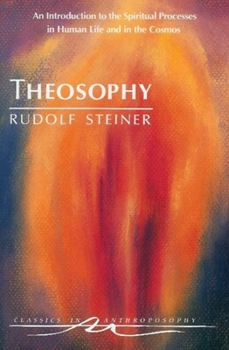Theosophy: An Introduction to the Spiritual Processes in Human Life and in the Cosmos (Cw 9)
(Part of the Classics in Anthroposophy Series)
Select Format
Select Condition 
Book Overview
Written in 1904 (CW 9)
Theosophy is a key work for gaining a solid footing in spiritual reality as described by Rudolf Steiner. It is organized into four parts. First, Steiner builds a comprehensive understanding of human nature: physical bodily nature; soul qualities; spirit being, or "I"-being; and the higher spiritual aspects. This leads us to Steiner's description of the human being as sevenfold:
- Material, physical body- Ether body, or body of life forces
- Sentient soul body
- Mind soul
- Spirit-filled consciousness soul
- Life spirit
- Spirit body
In the next section, Steiner offers an extraordinary overview of the laws of reincarnation and the principles of karma, as we pass from one life to the next. This prepares us for the third section, in which he shows the various ways in which we live--during life on earth and after death and in the three worlds of body, soul, and spirit.
Finally, we are given a succinct description of the path of knowledge, along which each person can begin to understand the marvelous and harmonious complexity of the psycho-spiritual worlds in their fullness.
This volume is a translation of Theosophie, Einf hrung in bersinnliche Welterkenntnis und Menschenbestimmung (GA 9).
Customer Reviews
Much Needed Wisdom for American Culture
STIMULATING AND THOUGHT PROVOKING
Occultists you need to read this
A difficult read, yet profound.
A profoundly comphrehensive portrait of the Universe.
Theosophie. Einfuerung in uebersinnliche Welterkenntnis und Menschenbestimmung Mentions in Our Blog






